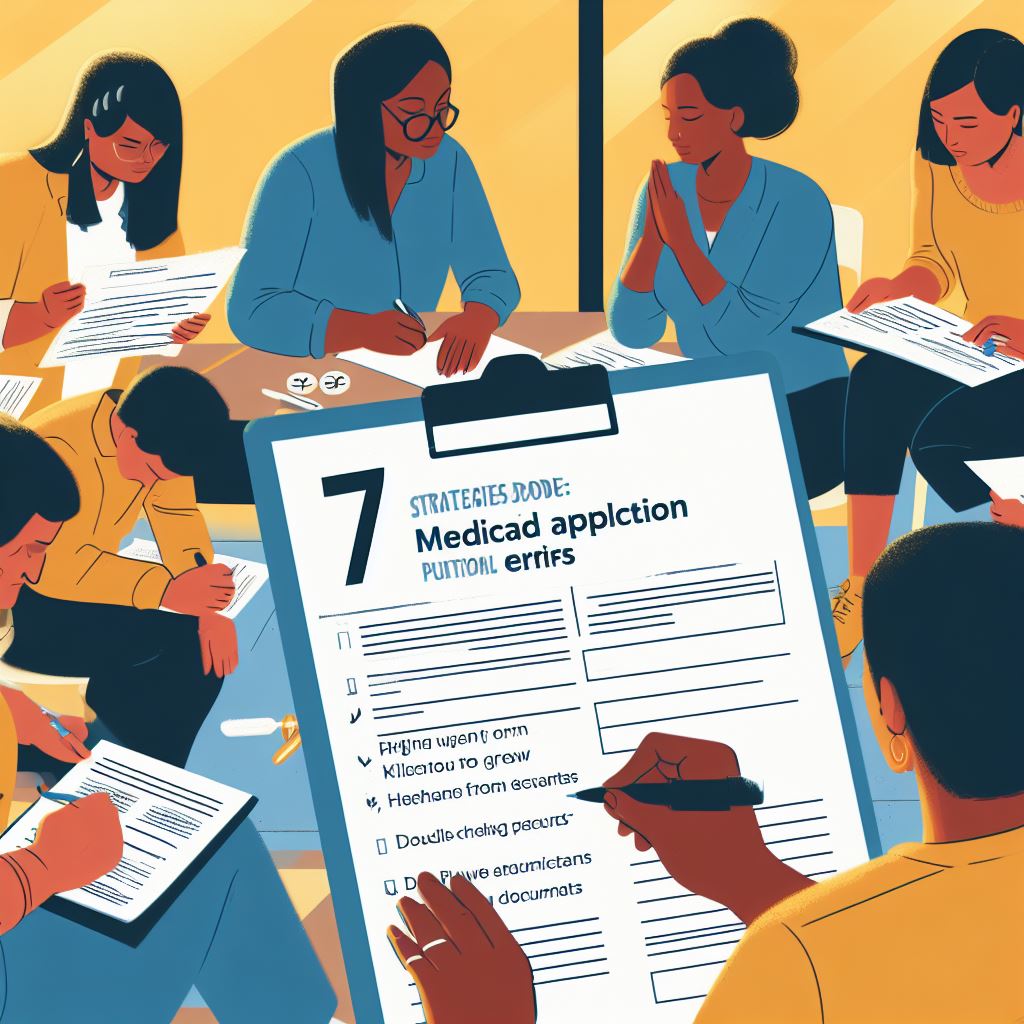7 Best Strategies to Dodge Medicaid Application Errors

Are you tired of struggling through the complicated Medicaid application process? Look no further!
We’ve got you covered with the 7 best strategies to dodge those frustrating application errors. With our expert tips, you’ll learn how to gather all necessary documents, understand eligibility requirements, and avoid common mistakes.
Stay organized and follow up on your application status to ensure a smooth and successful process. Don’t let Medicaid application errors hold you back – let’s get started!
Key Takeaways
- Gather all necessary documents including proof of identity, residency, income, assets, and medical expenses.
- Familiarize yourself with the eligibility requirements for Medicaid, including income limits, asset limits, and special criteria for age and disability status.
- Seek assistance from a Medicaid expert to guide you through the application process, ensure accuracy, and maximize your chances of approval.
- Stay organized throughout the application process by tracking tasks and deadlines, gathering documents in advance, and submitting the application on time.
Gather All Necessary Documents
To avoid potential errors in your Medicaid application, begin by gathering all necessary documents. Having the required documents ready will ensure a smooth and efficient application process. Start by gathering proof of identity, such as your driver’s license or passport. Additionally, gather proof of residency, such as utility bills or a lease agreement.
Next, gather documentation regarding your income. This may include recent pay stubs, tax returns, or proof of government assistance, such as Social Security benefits. If you’re self-employed, gather your business records, profit and loss statements, and any relevant tax documentation.
Don’t forget to gather documentation regarding your assets, such as bank statements, property deeds, or vehicle registrations. These will help determine your eligibility for Medicaid.
Lastly, if you have any medical expenses, gather supporting documentation such as bills or receipts. These can be used to calculate your medical deductions and potentially increase your eligibility for Medicaid.
Understand Eligibility Requirements
Make sure you understand the eligibility requirements for Medicaid by carefully reviewing the guidelines. Understanding these requirements is crucial to ensure that you qualify for Medicaid benefits. Medicaid eligibility is based on various factors such as income, assets, age, and disability status. Each state has its own specific guidelines, so it’s essential to familiarize yourself with the eligibility criteria in your state.
To determine if you meet the income requirements, you’ll need to provide documentation of your income, such as pay stubs or tax returns. Additionally, Medicaid has asset limits, which include both liquid assets like cash and non-liquid assets like property or investments. Understanding the asset limits can help you plan accordingly and ensure that you’re eligible for Medicaid.
Furthermore, age and disability status can also impact your eligibility for Medicaid. Some states have special eligibility criteria for individuals with disabilities or those who are elderly. Familiarize yourself with these criteria to determine if you qualify for any additional benefits or services.
By understanding the eligibility requirements for Medicaid, you can accurately assess your eligibility and avoid any errors or complications in your application. With a clear understanding of the guidelines, you can move forward confidently in the application process.
To ensure that you navigate the Medicaid application process successfully, seeking assistance from a Medicaid expert can be beneficial. They can provide guidance, answer any questions you may have, and help you navigate any complexities that may arise.
Seek Assistance From a Medicaid Expert
If you want to navigate the Medicaid application process successfully and avoid errors, it’s recommended that you seek assistance from a Medicaid expert. Applying for Medicaid can be a complex and confusing process, and having the guidance of someone who understands the intricacies of the program can greatly increase your chances of a successful application.
A Medicaid expert can help you understand the eligibility requirements specific to your state and guide you through the application process. They can assist you in gathering the necessary documentation and filling out the forms accurately and completely. This can help prevent common errors that may lead to delays or denials.
Additionally, a Medicaid expert can provide valuable advice on how to maximize your chances of approval. They can review your financial situation and help you make any necessary adjustments to meet the program’s income and asset limits. They can also provide guidance on how to handle any potential red flags that may arise during the application process.
Double-Check Your Application for Accuracy
Ensure that every detail on your Medicaid application is accurate. Double-checking your application is crucial to avoid errors that could potentially delay or deny your Medicaid eligibility. To ensure accuracy, carefully review each section of the application and verify that all information is correct.
Start by checking your personal details such as your name, address, and contact information. Any errors in these basic details can result in miscommunication or difficulty in reaching you during the application process.
Next, review your financial information, including your income and assets. Make sure to accurately report all sources of income, as well as any assets you own. Inaccurate reporting can lead to penalties or disqualification from Medicaid.
Additionally, carefully review the information related to your eligibility criteria, such as your citizenship status or disability status. Any mistakes in these sections can lead to a denial of benefits.
Avoid Common Application Mistakes
To maximize your chances of a successful Medicaid application, it’s essential to be aware of common mistakes that should be avoided.
One of the most common errors is failing to provide all the necessary documentation. Make sure you have copies of your identification, proof of income, and any other required documents before submitting your application.
Another mistake to avoid is providing incorrect or incomplete information. Double-check all the details, such as your address, Social Security number, and employment history, to ensure accuracy.
Additionally, failing to disclose all of your assets can lead to complications down the line. Be thorough in reporting all your assets, including bank accounts, property, and investments.
Lastly, be mindful of the application deadlines. Missing the deadline can result in delays or even denial of your application. Stay organized throughout the application process by keeping track of important dates and submitting your application well in advance.
Stay Organized Throughout the Application Process
Throughout the Medicaid application process, it is crucial to stay organized. This will help you ensure that you have all the necessary documentation and information ready, and it will also make the process smoother and more efficient. To help you stay organized, consider using a table like the one below:
| Task | Deadline |
|---|---|
| Gather required documents | 1 week before |
| Complete application form | 2 weeks before |
| Submit application | 1 day before |
| Follow up with Medicaid office | 1 week after |
Follow up on Your Application Status
To check the status of your Medicaid application, contact your local Medicaid office. They’ll be able to provide you with the most up-to-date information regarding your application. Here are some strategies to follow up on your application status:
- Make a phone call: Give the Medicaid office a call and ask to speak with a representative who can give you an update on your application. Be prepared to provide your application reference number and any other relevant information.
- Visit the office in person: If you prefer a face-to-face interaction, visit the local Medicaid office and speak with a representative. They’ll be able to assist you and answer any questions you may have.
- Check online: Many Medicaid offices have online portals where you can check the status of your application. Visit their website and log in using your credentials to view your application status.
Following up on your Medicaid application is crucial to ensure that it’s being processed correctly and in a timely manner. By utilizing these strategies, you can stay informed and address any issues that may arise during the application process.
Frequently Asked Questions
What Are Some Common Mistakes to Avoid When Filling Out a Medicaid Application?
To avoid common mistakes when filling out a Medicaid application, make sure to provide accurate and complete information, double-check all entries, and seek assistance if needed. Taking these steps can help prevent application errors.
How Can I Gather All the Necessary Documents for My Medicaid Application?
To gather all the necessary documents for your Medicaid application, start by checking the requirements on the application form. Then, gather your proof of income, residency, citizenship, and any other required documents.
What Should I Do if I Don’t Understand the Eligibility Requirements for Medicaid?
If you don’t understand Medicaid eligibility requirements, ask for help from a Medicaid representative. They can explain the guidelines and answer your questions. Don’t hesitate to seek assistance to avoid mistakes.
Can I Seek Assistance From a Medicaid Expert Even After Submitting My Application?
Yes, you can still seek assistance from a Medicaid expert even after submitting your application. They can help you understand the eligibility requirements and address any errors or issues that may arise.
How Can I Stay Organized Throughout the Medicaid Application Process?
Stay organized throughout the Medicaid application process by creating a checklist, gathering necessary documents, and setting reminders. Keep track of deadlines and follow up with any additional information required.



